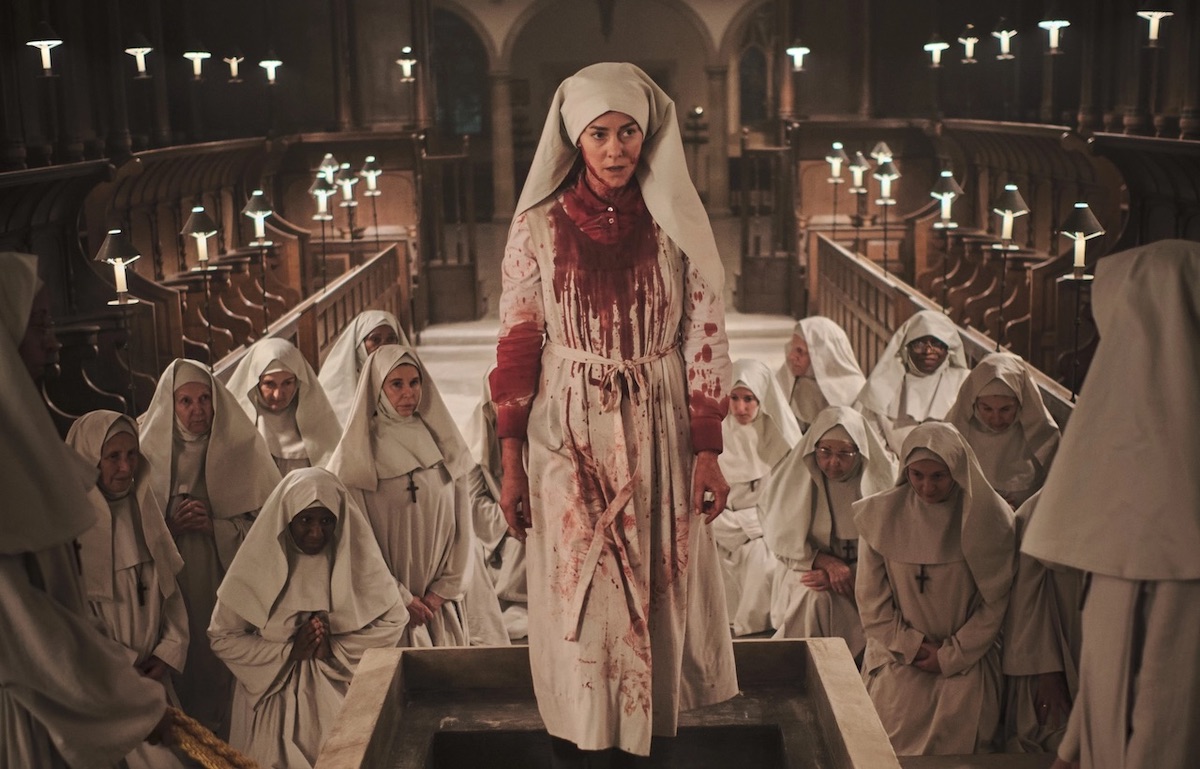Christopher Smith’s films have often been obsessed, in one way or another, with time. From the recursive looping of his breakout Triangle to the branching narratives of Detour, Smith has built an impressive, albeit underappreciated collection of twisty thrillers. If 2020’s The Banishing represented something of a return to horror, then his newest, Consecration, acts as a continuation of that film’s obsession with narrative and spiritual fragmentation.
Following Jena Malone’s skeptical Grace as she travels to a remote convent to investigate the death of her priest brother, Smith’s latest is preoccupied with how the sins of the church are grafted onto individuals. Yet, like The Banishing, Consecration bears an underbaked premise that’s more interesting in its singular moments than as a complete film. Heavy on style and light on narrative clarity, almost nothing coheres.
Moody, but never as scary one would hope, it is ostensibly about discovering what happened to Grace’s brother, whom Mother Superior (Victoria Donovan) says died while fighting a demon. As she and an investigator (Thoren Ferguson) unpack the history of the Scottish convent, Grace’s hold on reality begins to slip, with her hallucinating while roaming the convent grounds. Meanwhile the church, led by Danny Huston’s Father Romero, is also preparing for a cryptic ritual tied (somehow) to their history with the crusades.
For a script jammed with intertwining religious and personal histories, Smith and co-writer Laurie Cook’s work is missing key context and exposition. This mainly stems from the decision to dole out backstory in fragmentary flashbacks. As Grace reads through her brother’s diary, we are told about her abusive upbringing, her menacing father, and her relationship to her brother, but never get a sense of a complete or coherent history.
Instead Consecration is fragmentary, jumping from scene to scene with little sense of transition or continuity. Some of these scenes––particularly as Grace begins experiencing what one nun calls visions from “your past and future” simultaneously––are compelling. As Grace begins to lose it we are subjectively placed beside her, a profound sense of déjà vu emerging as scenes double back on themselves, repeating with odd variations. It’s here where Smith demonstrates what he’s always excelled at: streamlining and visualizing whatever twisty logic his scripts cook up.
For the many contained moments that work well, it never adds up to anything. Across much of the film Smith holds back important details about Grace’s life and her relationship to the convent. All is in an effort to provide a shocking ending that, once it comes, proves not quite a twist––those scenes of the crusades hint as much––but it also makes for a somewhat bewildering viewing experience: seemingly nothing makes sense until everything clicks into place in the final few minutes and, even then, the pieces don’t exactly fit. How her brother died is also treated as an afterthought, even though Consecration is ostensibly about her investigation.
Even with such a muddled narrative, Smith––alongside cinematographers Rob Hart and Shaun Mone––showcase some visual wit. While Smith repeats his endless fascination with mirrors, including a reverse tracking shot that liberally cribs from Contact, the film is really quite beautiful, juxtaposing green Scottish highlands against the clinically white convent. Admiration’s equally due for a series of split-diopter shots that foreground Malone’s acting.
Malone is also asked to do quite a lot here. Simultaneously conveying the panic and confusion, she’s strong in the role––a reminder that while she’s worked well as a supporting player over the years, she really needs to be the center of more movies. Yet it’s hard to grasp the progression of this figure, if only because the script is so splintered, jumping through time in a way that makes it impossible to track her characterization.
Consecration isn’t an outright failure, but certainly a little too in love with its own schematic design, sacrificing clarity and characterization in the process. While it has interesting things to say about cycles of abuse and the overlap between the church and abusive parents, those ideas are lost in a haze of non-linear storytelling. Even with such problems, this is compelling in individual scenes; if only they added up to anything.
Consecration opens in theaters on February 10.

